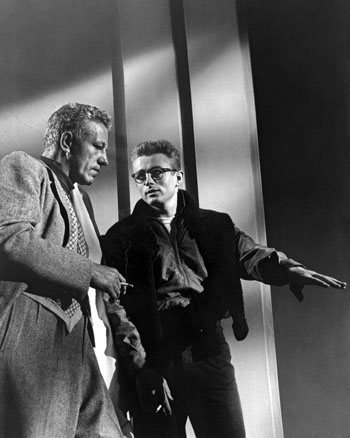Starting today, BFI Southbank in London is presenting extended runs of Rebel Without a Cause (1955), East of Eden (1955) and Giant (1956) and the new 4K restorations will be touring other cities in the UK as well (click the titles for screening schedules). Rebel “boasts James Dean’s very finest performance,” argues BFI programmer Geoff Andrew. “Inspired partly by Romeo and Juliet, partly by [Nicholas] Ray’s research into juvenile detention centers, the film is notable for the kinetic dynamism of Ray’s visually precise, near-Expressionist direction, for the sympathy extended to all the characters, and for the intensity of the performances.”
The BFI also has notes from Helen de Witt on East of Eden: “Elia Kazan’s film established Dean’s stardom; the only one of his three films to be released in his lifetime and the only one that he saw in its entirety.” And on Giant: “James Dean’s final film marks a ‘changing of the Guard’ from old Hollywood to modern acting methods.”
“James Dean epitomized an age that had not, nominally, existed before,” writes Thirza Wakefield for the BFI. “The word ‘teenager’ didn’t come into use until the second half of the 20th century, before which time one described an adolescent in terms of what he or she wasn’t. You were what they called a ‘pre-adult’–you were co-dependent, in-parentheses, apprenticed to adulthood. As Cal [in East of Eden], Dean created an identifiable behavioral type, playing a capable, inquisitive kid growing up in rural California, competing for the affection of his evangelical father. He deepened it with Jim, a disillusioned adolescent, uprooted to a new town in Rebel without a Cause. Jim is the inarticulate custodian of his own inviolable sense of right, which sours him and saves no one in the end. Both boys had selfhood, sensibility; they were proud and anti-authoritarian, and as contradictory as any kid had a right to be.”
For Geoffrey Macnab, writing in the Independent, Dean “remains the most paradoxical of movie stars. On the one hand, he stands for a self-obsessed post-war generation that rejected the hypocrisy of the adult world, chafing against all authority and institutions…. On the other hand, Dean is also the poster boy for an age of teenage consumerism.” Rebel‘s “17-year-old may scorn the timorousness and moral cowardice of his parents… but that doesn’t stop him spending their money or driving to his new LA school in a car they provided.”
“Dean was a new kind of man,” writes India Ross in the New Statesman. “His characters cried and struggled and screamed in frustration at the blurry world they had to live in. They were awkward and uncertain, grappling with sexuality and the disappointment in older men around them.” And “the successors to James Dean are in evidence everywhere. From the contemplative Ryan Gosling to the part-time poet James Franco, the Emotional Man is now a marketable asset…. From Michael Cera to Jesse Eisenberg, the cinema is synonymous with a group of loping, hobbit-haired boys so divorced from masculinity that their characters actively mock the idea of sexual power. A swelling interest in superheroes, as an object of ironic admiration by the tech generation, is not coincidental, as fanboys reflect on a lost type of man, so distant from themselves.”
Time Out‘s Cath Clarke presents a list: “Six things you’ve always wanted to know about James Dean.”
For news and tips throughout the day every day, follow @KeyframeDaily on Twitter and/or the RSS feed. Get Keyframe Daily in your inbox by signing in at fandor.com/daily.




